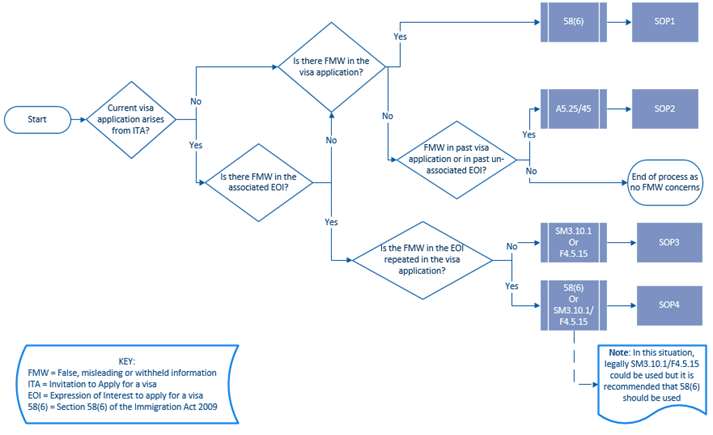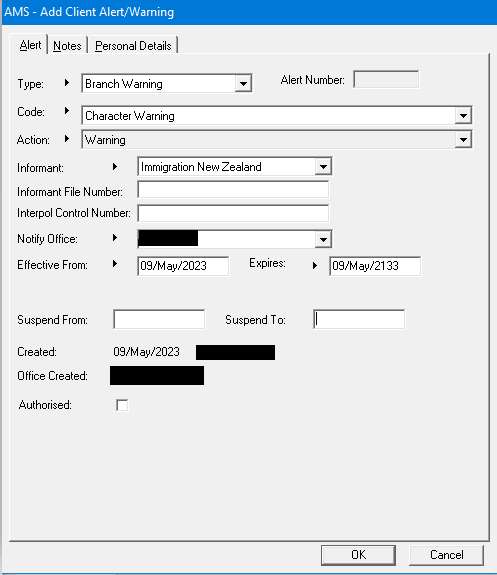Guidance for approving applications with false
information or character issues using a streamlined
process
Last updated: August 2024
Section 1: Background
Changes to immigration and operational instructions related to visa applications containing false,
misleading and withheld (FMW) information took effect on 25 September 2023. As advised i
n VisaPak
557, the two most important changes were:
1982
1) If an application is to be declined because of false, misleading or withheld information in that
application, immigration officers (IOs) should now use
section 58(6) of the Immigration Act (the
Act
Act), and not the A5 character instructions, to decline the application. Section 58(6) of the Act is
set out a
t A24 of the Operational Manual.
2) The character instructions now clarify that there is no need for an IO to establish an applicant
personally intended to provide false or misleading, or to withhold relevant information, in a
previous application before determining there is a character issue which would require a waiver
consideration.
Information
Usually where section 58(6) or character instructions are engaged, a potentially prejudicial
information (PPI) process is followed and the applicant is asked to comment on the issue as well as on
why they think they should be granted a waiver (if applicable) and visa, despite the issue.
However, there are certain cases, before the PPI step, where a technical advisor (TA) or IO may
Official
determine that granting a waiver (if applicable) and visa may be justified without inviting the applicant
to comment. As such, the adverse information causing the character or false/misleading issue does
not in fact meet the definition of PPI as found in immigration instructions, since that information is
the
not
prejudicing the outcome of the on-hand application.
A process has therefore been agreed where a processing office, in appropriate cases as described
below, can:
under
a) proceed to approve the application without conducting a PPI process with respect to the issue;
and
b) use a shortened waiver or False and Misleading Information template to record the character
waiver approval.
Section 2: Guidance on when to use - consultation with Practice Lead required
Released
This streamlined process should generally only be used for temporary entry applications where the
application is not eligible for the ‘fast track character waiver’ (FTCW) process (because, for example,
no previous character waivers have been granted for the issue).
This process must
only be used where there are strong special circumstances for granting the waiver
and/or visa and the seriousness of the character issue or FMW information is at the lower end of the
spectrum.
An example where the streamline process might be appropriate is in the case of an asylum claimant
work visa application, and the incident of false information provided in the application is minor.
An IO or TA should discuss a potential streamline case with their Practice Lead (PL) before deciding
not to take the PPI step, and the decision not to PPI must be agreed to by the PL. Any PL agreement
to use this process must be noted by the PL in the relevant assessment template (V586a or V316d –
see section 3 below).
On an initial assessment of the case, the IO and TA/PL should determine whether further information
from the client is needed to determine the character waiver or approve the visa. Consideration should
be given to whether a PPI response may:
1) Reveal significant information about the circumstances of the criminal offending, 1982
2) Provide more insight into the applicant’s state of mind or involvement with regard to the false
information, and/or
3) Clarify the facts around the issue at hand and therefore provide a greater level of c
Act ertainty
about the falseness of the information which the applicant had initially provided.
However, if it is felt that a PPI response would likely not shed any more light on these issues (and, as
above, there are strong special circumstances), then the TA/PL and IO can proceed with the process
below without a PPI step.
Section 3: Process - Recording and communicating the decision to not use s58(6) or to
grant a character waiver
Information
It is important that the decision to use this process is clearly recorded in AMS and ADEPT and
communicated to the applicant in each application where this process is followed. For example, the
presence of the character or 58(6) concern and approval of the waiver needs to be flagged in the
approval letters, and character warnings need to be raised where they do not exist currently.
Official
Approval letter inserts
Letter inserts for approval letters and eVisas, where the streamlined approval process has been used,
the
are available at the
Letter Insert Bank at Rows 18 and 19.
Assessment templates
Shortened assessment templates are available in AMS-TLS to support this process. They are:
under
- V586a – False and Misleading Assessment Temporary Entry Approval Without PPI
- V316d – Character and Waiver Assessment Temporary Entry Approval Without PPI
These templates are not yet available in ADEPT. In the meantime, ADEPT users wil need to copy and
paste the AMS-TLS templates above into the ADEPT templates and upload the completed assessment
template as a document (classification set as internal) for any particular application undergoing this
process. Refer to
2.13 o
Released
f the ADEPT user guide (V
iew and open documents).



1982
Act
Information
Official
the
under
Released
1982
Act
Information
Official
the
under
Released
1982
Act
Information
Official
the
under
Released

1982
Act
Information
Official
the
under
Released

1982
Act
Information
Official
the
under
Released
1982
Act
Information
Official
the
under
Released
1982
Act
Information
Official
the
under
Released
1982
Act
Information
Official
the
under
Released
1982
Act
Information
Official
the
under
Released

1982
Act
Information
Official
the
under
Released
Document Outline





